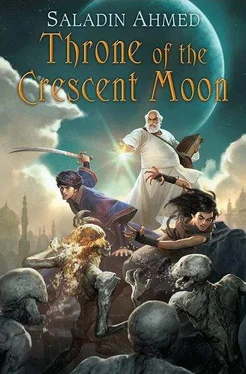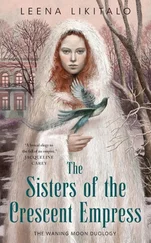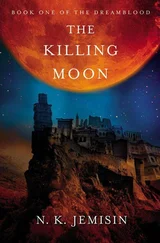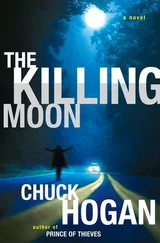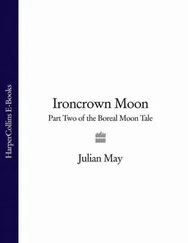“God’s peace, young man. I must get in touch with Captain Hedaad immediately regarding an urgent matter.”
The boy said, more politely than Dawoud expected from a watchman, “If you’ve got a complaint about the watch, Uncle, I’m afraid you’ll need to take it to the eastern gates office. They’ll get you an audience with a vice captain and in a few days perhaps—”
“Forgive me, young man, but this is not a matter that can wait. My name is Dawoud Son-of-Wajeed, and I am well-known to Roun. I promise you that if you give him my name he will want to see me right away.”
The boy fixed those soft eyes on Dawoud, trying to somehow spy out ill intent. He put an idle hand on his mace and scratched his nose. “Well-known, huh?” Another long look. “Fine. But you’d better not be jerking me about here, Uncle.”
Dawoud inclined his head graciously.
Half an hour later a different watchman led Dawoud into a small chamber just inside the palace proper. The room was crowded with grain sacks and coils of chain, but there was a small divan in the corner. The watchman gestured to it gruffly, then left. No sooner had Dawoud settled gratefully down onto the dark wood than Roun Hedaad’s wide frame filled the doorway.
Dawoud started to stand, but the Captain of the Guard kept him from doing so. He bent down to embrace Dawoud and they exchanged greetings. Then Roun sat beside him.
The squat man had always seemed to Dawoud to be cut from a block of brown stone. There was the slightest bit of gray in his thick black moustache now and a few tiny lines at his eyes. But he looked as hard as ever, as did the masterwork four-bladed mace at his side.
“Thank you for making time to see me, Captain.”
The man scratched his club-shaped nose. “I can always make time for a man who saved my life.”
Dawoud waved a dismissive hand. “Well, my wife’s tonics had as much to do with that as anything. Besides, we were paid a good price for our work then.”
“Fair enough. So what is it you have come here to ask then, Uncle?”
If it were Litaz here, she’d have planned all of the words to use here. But that was not how he did things. “You know some of the strange, cruel magics my wife and I once made a life of fighting,” he said to the Captain of the Guard. “I’ve come to you because such a threat is loose in Dhamsawaat now.”
Dawoud told what little they knew of Mouw Awa and his master Orshado. The names. The killing they had done. As he told his tale, the captain’s unsubtle face was easy for Dawoud to read—shifting from annoyed disbelief to deeper consideration to half-skeptical fear. But the captain was respectful enough not to interrupt.
“All I ask,” Dawoud began, then fell silent when a richly-dressed page came darting in. The page ignored Dawoud and whispered something to the captain. Dawoud’s old ears could only make out the words he wants, your turn, and Roun’s protests, before the boy left the room.
Roun grimaced at him. “Well, Uncle, you’re in luck—His Holiness asks me on occasion to bring before him whatever security matter I am dealing with at a given time. He does the same with his ministers of treasury and his under-governors. He does it to show his active interest and to let the many arms of his government benefit from his wisdom.” There was no irony in Roun’s voice—indeed, the Captain made an admirable effort to infuse the words with sincerity, but Dawoud needed no magic to tell the man’s true feelings.
Still, this may be for the best. Perhaps the Khalif will actually listen .
Dawoud was shown not into the Court of the Crescent Moon, but into a small audience chamber. “Small” for the Crescent Moon Palace, of course, meant that the room was larger than Dawoud’s whole house, but it felt different from the publicly visible parts of the palace Dawoud had seen. Here the auras of opulence and command did not exactly diminish, but they took on a kind of intimacy. This was a place for a powerful man to pretend he was lending his ear. Almighty God willing, he will lend it in truth .
Dawoud was announced with a string of the tepid pleasantries spent on common people. The court-speaker boomed in his baritone that the guests were honored to be in the presence of “God’s Regent in the World, the Defender of Virtue, the Most Exalted of Men, His Majesty the Jabbari akh-Khaddari, Khalif of Abassen and of all the Crescent Moon Kingdoms.” Then, in unison with Roun, Dawoud knelt and bowed as deeply as his weak limbs would let him.
High windows displayed Names of God in glass ground with emerald and opal. No noise from the palace bustle outside came through the plush brocade drapes. Off to one side, court musicians played reed pipes and two-stringed fiddles, all plated in platinum. Thick carpets of puzzlecloth, worked over and over again with the Khalific seal, muffled the sound of footfalls. At the far side of the room, just below the ceiling, a strange gold lattice box, the size of a small carriage, protruded from the wall just above head height. The Khalif’s speaking-box. Designed so that Abassen’s ruler could hold court without enduring the profane gazes of his subjects. And within sat the Defender of Virtue.
The small, rose marble archway below the box was flanked by two cowled, black-robed men who gave off, to Dawoud’s sorcerous senses, a heady waft of magical power. Court magi. Legally, no one in Dhamsawaat worked spells without the permission of the Khalif’s own enchanters. In reality, a number of minor spells, invocations, and ghul-raisings went on without this handful of men being able to stop them. The true purpose of the court magi was preventing the practice of any magics that might harm the Khalif or his wealth. Dawoud knew little of their ways, though—they spent their time cloistered in their own minaret behind the palace proper. What went on within that thin spire of silvery stone, God alone knew. Dawoud knew only the scorn with which this sort regarded the vulgar magics of a man like himself.
Dawoud saw vague movement behind the golden grillwork of the speaking box. Does he always hold court from within that stifling cage? The idea made Dawoud ill, but it lent a sudden sense to some of the Khalif’s more ruthless acts. Ruling from such confinement could make a man mad. This is what Adoulla—and that mad Falcon Prince he admires so much—do not see: that everyone pays a price for the way the world works, even the so-called powerful. That power is a trap as well. The effects of magery on his own body had long given Dawoud a keen—not to say, brutal—awareness of such facts.
The sun shone through the jewel-tinted windows and the Khalif’s box seemed to be wreathed in rainbows. Cage or no, for a moment Dawoud almost believed the man was God’s Regent in the World.
The court musicians stopped playing. A long-faced man dressed in rich silks, clearly a senior minister of some sort, asked Roun what matters of guardsmanship he brought before the court.
Only then did Roun seem to recognize the wispiness of what he knew. His face flashed confusion, but he spoke steadily. “This man beside me, O Defender of Virtue, is Dawoud Son-of-Wajeed. He is a true servant of God who once saved my life when a poisoner tried to kill me to stop me from serving your father. More to the point, your Majesty, this man has spent many years hunting the minions of the Traitorous Angel. He was in the midst of telling me about a potential threat to Your city, majesty, when you summoned me here. It is, perhaps, best if I let him tell the court.”
“O Most Exalted of Men, I am here to ask you—” Dawoud began, trying in his rough Red River way to use court phrasings the way Litaz had taught him long ago.
Читать дальше
